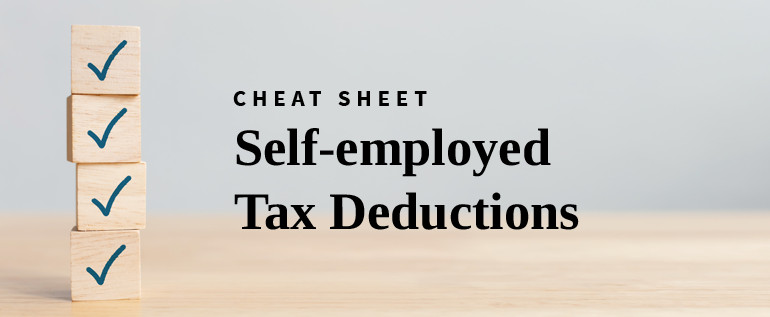Self Employed Tax Deduction Cheat Sheet
Use this self employed tax deduction cheat sheet to take advantage of the many business-related tax deductions. You can reduce your business income by a chunk before you check the tax you owe. One problem is that too many self-employed entrepreneurs miss allowed deductions simply because they either don’t know about them or forget them. If you don't tell your tax accountant about your expenses and deductions, they won't be able to include them in your return and save you money.

How to Use Our Tax Deduction Cheat Sheet
Use this self employed tax deduction cheat sheet to help you pull together an accurate tax return that minimizes what you might owe the IRS. Just check off the items as you validate them with your records, or for those you’re not taking, use an “X”. This way, at a glance you can see where you are and what you need to do.
Check the IRS Publication 535, Business Expenses for eligibility of deductions. That tax code changes regularly, so check with the IRS or a tax professional when you file your tax return.
| Category | Deduction Description | |
Advertising | Most, if not all, or your expenses for marketing and advertising your business are deductible. Brochures, websites, newspaper ads, TV and radio advertising, promotional materials like refrigerator magnets, and even some sponsorships of local sports teams or activities. IRS.gov provides more information on advertising deductions here. | |
| Business Insurance | Insurance with the purpose of protecting your business; this includes liability insurance, business theft, business property, even insurance to protect intellectual business property. | |
Vehicle Expenses | Using either a standard mileage expense deduction or itemized deductions; for 2022 the standard deduction is $0.585/mile. If using the actual expense method, you would deduct fuel, maintenance, and other operational expenses, and you can depreciate the vehicle as well in some cases. | |
| Depreciation & Section 179 | Business real estate, sometimes vehicles, equipment, machinery, computers, printers, etc. are depreciated over a lifetime as specified by the IRS. Section 179 allows you to write off the entire cost of equipment in the year purchased if qualified property and within defined limits. | |
Home Office | The home office deduction is a group of expenses related to a space in your home that you use exclusively for business. If the space qualifies, you can expense the space based on its percentage of the overall home square footage. You can write off that percentage of mortgage interest (or rent), utilities, repairs, insurance, and property taxes. | |
| Meals | If you meet with a client, customer, or business associate, you can generally deduct 50% of the cost of the meal. | |
| Office Expenses | Expenses related to your office space, like a cleaning service, repairs to office equipment or furniture. | |
Supplies | Office supplies, cleaning supplies, supplies you use to produce a product or conduct your business are included. Printer paper, ink, and other computer related product costs would be deductible. | |
Travel | If you travel for business, you can generally deduct air or ground transportation costs, hotel bills, rental car costs, and local transportation costs. | |
| Software | Software is purchased in two ways, either outright or with ongoing fees as SAAS, Software as a Service. Either way, if it is for business, it is a deductible expense. | |
| Professional Fees | Fees you pay to attorneys, accountants, or consultants that are business-related are deductible. | |
| Facilities Expense | You can deduct expenses related to maintaining your office or business space, such as utilities, insurance, cleaning services, mortgage interest (or rent), and repairs. | |
Education | Some education expenses are deductible if related specifically to the operation of your business. For example, a self-employed real estate agent can deduct continuing education costs if required to retain a license. | |
| Debt Interest | If you finance a business vehicle, use credit cards solely for the business, or borrow money for business purposes, you can deduct the interest on the debt. | |
| Pension Plan | There are options for IRA, Individual Retirement Accounts, for you personally, and also 401(k) plans for employees, even family members. | |
| Equipment Rent | If you rent equipment or machinery for your business, you can deduct the rental cost. You may even rent a high-end print system for a monthly fee, which would be deductible. | |
| Taxes and Licenses | Business taxes and licensing fees are deductible. This would include any local business taxes. | |
| Commissions | Sometimes you pay commissions to others to bring you business, and this would be a deductible expense. | |
| Contract Labor | When you hire subcontractors, whether to do work you resell or to do work on your business property, the cost is deductible. | |
| Health Insurance | Health insurance premiums you pay as a self-employed worker are deductible. | |
FICA Taxes | Social Security and Medicare taxes, currently totaling 15.3% of self-employment net income, are borne entirely by you. As an employee, your employer paid half and took half out of your pay. Now that you are the employer, you can deduct the employer half of FICA paid. | |
| Startup Expenses | Usually, the expenses of starting a business, including the structure of the business must be depreciated with a partial deduction annually. | |
| Qualified Business Income | The QBI, Qualified Business Income deduction is currently 20% of net income. Sole-proprietorships, partnerships, S-Corporations, and most LLCs can take advantage of this deduction. | |
| Phone and Internet | Business phones, or the business portion of personal phone use are deductible expenses. Internet access fees are as well. | |
| Other Expenses | There are many other deductions that are available if they are legitimate business expenses. Examples could be industry publications, business association dues, etc. | |
| Bad Debts | If you invoice customers and they don't pay the entire balance, you can deduct the open debt as "uncollectable". | |
| Charitable Contributions | Charitable contributions made by the business are deductible expenses in most cases. |

How Should You Document Expenses?
All deductions you claim for your business must be documented with:
- Receipts
- Invoices
- Canceled checks
- Bank statements
- Credit card receipts
- Credit card statements
- Loan documents
- Mortgage documents
- Interest statements
It is your responsibility to keep these records and make them available should the IRS question some of your deductions. The IRS will want details with all documentation. For receipts, where the expense was incurred, date, business purpose, amount, and how paid will be required. Relying on a credit card statement is not sufficient – always ask for and keep merchant receipts for expenses.
What is Deductible According to the IRS?
In Publication 535, the IRS states that “a business expense must be both ordinary and necessary.” Ordinary expenses are those that are accepted and common in the industry. Necessary does not mean that the business cannot do without the expense. The IRS simply requires that it be appropriate and helpful to the business.
Especially when it comes to travel and entertainment expenses, it can be easy to get on the wrong side of the IRS. Many self-employed individuals take their spouses along on business trips. This is great, but you must carefully separate personal expenses from business expenses. Talk with a tax professional to optimize your business expenses and deductions.
Cost of Goods Sold (COGS)
The expenses above are related to the operation of the business, not those specifically used in the manufacture, assembly, or inventory of items for resale. Self-employed individuals selling products have a separate section of their Schedule C dealing with the cost of goods sold. The types of goods that are a part of the COGS include:
- Products or raw materials used to manufacture or assemble items for resale
- Storage
- Direct labor costs of employees who produce the items
- Overhead costs of the facility used for manufacturing, assembly, and storage
Since the rules can get complicated, a tax advisor or accountant can help you figure out which costs you can deduct and which you must depreciate. Generally, self-employed individuals qualify as small business taxpayers, and the rules are simpler.
The cost of goods sold calculation involves these steps:
- An inventory of products and materials is taken at the beginning of the year
- Costs of items and materials added to the inventory during the year are recorded
- An end of year inventory is conducted
- The difference in the beginning and end of year inventory is the Cost of Goods Sold
This is a simplified explanation, so consult with your tax advisor or accountant to get the details right for your business.
Summary
Before meeting with your tax preparer or accountant, use this self employed tax deduction cheat sheet to make sure you have your ducks in a row. Don’t miss an allowed deduction because it slipped through the cracks. While not impossible, it can be costly to correct or amend returns once they’ve been filed.

